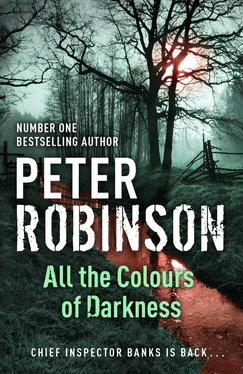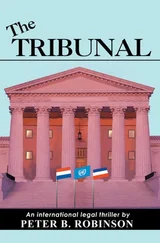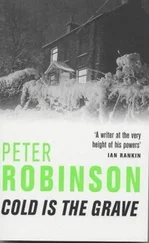Peter Robinson - All the Colors of Darkness
Здесь есть возможность читать онлайн «Peter Robinson - All the Colors of Darkness» весь текст электронной книги совершенно бесплатно (целиком полную версию без сокращений). В некоторых случаях можно слушать аудио, скачать через торрент в формате fb2 и присутствует краткое содержание. Город: London, Год выпуска: 2008, ISBN: 2008, Издательство: Hodder & Stoughton, Жанр: Полицейский детектив, на английском языке. Описание произведения, (предисловие) а так же отзывы посетителей доступны на портале библиотеки ЛибКат.
- Название:All the Colors of Darkness
- Автор:
- Издательство:Hodder & Stoughton
- Жанр:
- Год:2008
- Город:London
- ISBN:978-0-340-83692-7
- Рейтинг книги:5 / 5. Голосов: 1
-
Избранное:Добавить в избранное
- Отзывы:
-
Ваша оценка:
- 100
- 1
- 2
- 3
- 4
- 5
All the Colors of Darkness: краткое содержание, описание и аннотация
Предлагаем к чтению аннотацию, описание, краткое содержание или предисловие (зависит от того, что написал сам автор книги «All the Colors of Darkness»). Если вы не нашли необходимую информацию о книге — напишите в комментариях, мы постараемся отыскать её.
All the Colors of Darkness — читать онлайн бесплатно полную книгу (весь текст) целиком
Ниже представлен текст книги, разбитый по страницам. Система сохранения места последней прочитанной страницы, позволяет с удобством читать онлайн бесплатно книгу «All the Colors of Darkness», без необходимости каждый раз заново искать на чём Вы остановились. Поставьте закладку, и сможете в любой момент перейти на страницу, на которой закончили чтение.
Интервал:
Закладка:
Annie laughed. “Well, at least you’re thinking along the right lines.”
“Come on,” Banks said. “Let’s go have a shufti around Silbert’s house. The SOCOs should be pretty much done there by now. Then we’ll have another word with Edwina at the Burgundy. I get the impression that she’s got something else on her mind, too. We’ll see if we can find out something to shed a little more light on these matters.” “Sounds like a plan to me,” said Annie.
A couple of SOCOs were collecting the remaining trace evidence in Silbert’s upstairs drawing room when Banks and Annie arrived there early on Sunday afternoon, but apart from them, the place stood empty.
“We’ve had a good look around,” Ted Ferguson, one of the SOCOs, told them, “and there’re no hidden safes or compartments anywhere in the house. The only rooms with any personal stuff and papers in them are this one and the study down the hall.” He handed them some latex gloves from the crime scene bag on the floor near the door. “We’ve got a few more things to do downstairs, but we’re done up here for now. We’ll leave you to it. Wear these.”
“Thanks, Ted,” said Banks, opening the seal and slipping on the gloves.
The SOCOs went downstairs, and Banks and Annie stood on the threshold and took stock.
Even though the body and the sheepskin rug it had lain on were gone, the blood spatter left on the walls and the traces of fingerprint powder on every surface now marked it as a crime scene. The framed photo under the shattered glass still lay on the floor. It showed Mark Hardcastle smiling, standing next to Silbert. Banks picked it up carefully, brushed off some of the fingerprint powder and studied Silbert’s face. Handsome, certainly, cultured, slender and fit, and seeming much younger than sixty-two, he had a strong cleft chin, a high forehead and clear blue eyes. His dark hair had thinned just a little at the temples, and showed traces of gray above his ears, but it suited him. He wore a light blue cashmere jumper and navy chinos.
Annie pointed out the framed blowup of Hindswell Woods on the wall. Most of the blood had been wiped off, though a few drops had smeared here and there. “Not a bad effort,” said Banks. “Whoever took it had an eye for a picturesque woodland scene. The way the light filters through the leaves and branches is beautiful.”
“That’s the tree Mark Hardcastle hanged himself on,” Annie said, pointing out the oak. “It’s very distinctive.”
They both gazed at the picture for a few moments, Banks remembering what Edwina Silbert had said last night about walks in woods full of bluebells. Then they started the search.
Silbert’s computer showed nothing out of the ordinary on a cursory examination carried out by Annie, but it would have to be checked thoroughly by technical support if the evidence pointed toward a killer other than Mark Hardcastle. The desk drawers held only stationery, holiday snapshots and a few files full of business receipts, along with telephone and utility bills.
A set of keys in the middle drawer opened a locked antique wooden cabinet on the floor beside the desk. Inside, Banks and Annie found the deeds to the house, bank statements, checkbooks and all the other papers they needed to discover that Silbert had been in the millionaire-plus bracket. His civil service pension certainly didn’t account for it, but regular checks from Viva and its various subsidiaries did. There were also a few large transfers from foreign bank accounts, Swiss mostly, the nature of which remained unclear, but on the whole the mystery of Silbert’s wealth was solved. There was no will, so Silbert had either left one in the keeping of his solicitor, or he hadn’t made one, in which case his fortune would go to his mother.
On the bottom shelf of the cabinet, Banks found a small bundle of personal letters held together by a rubber band. The first was dated September 7, 1997, and was from someone called Leo Westwood at an address in Swiss Cottage. Banks read through it quickly, Annie looking over his shoulder. It was written in a neat, sloping hand, by fountain pen, judging from the varying thickness of the ink strokes.
Most of the content dealt with the death of the Princess of Wales and its aftermath. Westwood seemed to have little patience for Diana’s brother’s attack on the Royal Family in his funeral oration the previous day, finding it “inappropriate and ill-advised,” or for the general outpouring of grief from “the hoi polloi, who love this sort of thing almost as much as they love Coronation Street and East Enders.” Banks wondered what he would make of the recent inquiry and the accusations flying around about Prince Charles, the Duke of Edinburgh and MI6.
There were also references to an afternoon’s antique hunting, a George I card table with an inlaid pattern that Silbert “would simply have adored,” and a delicious meal, including foie gras and sweetbreads, with “Gracie and Sevron” at a Michelin-starred restaurant in the West End, where they saw one of Tony Blair’s cabinet ministers dining with an out-of-favor colleague.
The letter, like the rest, had been sent to Silbert, as diplomatic post, at the British Embassy in Berlin. Banks wondered if it had been read by censors. Gossipy as it was, there was nothing seditious in it, nothing calculated to bring the wrath of HMG down on Westwood or Silbert, and the only overt political reference was to Egon Krenz’s recent conviction for a shoot-to-kill policy on the Berlin Wall. All in all, it was chatty, well informed, snobbish and affectionate The writer was, no doubt, aware that his words would probably be read by people other than the intended recipient, so if he had been Silbert’s lover at the time, he had shown remarkable restraint. When Annie had finished reading it, Banks put the letter back in its envelope and returned it to the pile.
“Do you think these could have caused a row?” Annie asked, tapping the pile of letters.
“It’s possible,” Banks said. “But why now? I mean, they’ve probably been lying around since the late nineties, unless Silbert suddenly discovered them somewhere.”
“Maybe Hardcastle did a bit of prying on Thursday evening or Friday morning while Silbert was still away in Amsterdam?”
“Maybe,” said Banks. “But surely he’d had plenty of opportunities to pry before? Silbert traveled quite a bit. Why now?”
“Jealousy got the better of him?”
“Hmm,” said Banks. “Let’s go have a look down the hall.”
The room was clearly Hardcastle’s study, and it was much less tidy than Silbert’s. Most of what they found related to Hardcastle’s work at the theater and his interest in set and costume design. There were notes, sketches, books and working scripts marked up with different-colored inks. On his laptop was a computer program for generating various screenplay formats, along with the beginnings of one or two stories. It appeared as if Hardcastle himself had also been interested in writing a movie script, a ghost story set in Victorian England, judging by the first page.
In the top drawer of the desk, on the latest copy of Sight & Sound, lay a memory stick of the type most commonly used in a digital camera.
“That’s odd,” Annie said, when Banks pointed it out to her.
“Why?”
“Hardcastle has a digital camera. It’s over here on the bottom bookshelf.” She picked up the small silver object and carried it over to Banks.
“So?” said Banks.
“Don’t be such a Luddite,” Annie said. “Can’t you see?”
“Yes, I can see. Digital camera, memory card. I still say, ‘So what?’ And I’m not a bloody Luddite. I’ve got a digital camera of my own. I know what memory cards are for.”
Читать дальшеИнтервал:
Закладка:
Похожие книги на «All the Colors of Darkness»
Представляем Вашему вниманию похожие книги на «All the Colors of Darkness» списком для выбора. Мы отобрали схожую по названию и смыслу литературу в надежде предоставить читателям больше вариантов отыскать новые, интересные, ещё непрочитанные произведения.
Обсуждение, отзывы о книге «All the Colors of Darkness» и просто собственные мнения читателей. Оставьте ваши комментарии, напишите, что Вы думаете о произведении, его смысле или главных героях. Укажите что конкретно понравилось, а что нет, и почему Вы так считаете.












